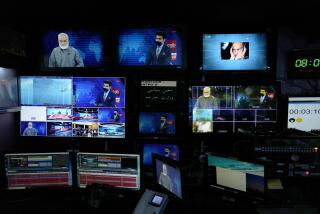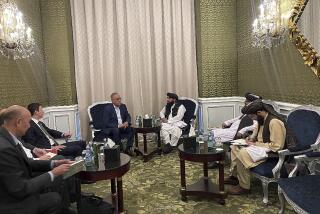New Kabul network accents entertainment
- Share via
KABUL — Afghanistan has its first entertainment television channel, less than three years after the fall of the radical Taliban regime that banned the medium.
Using a mobile antenna positioned on a hill overlooking the capital, the broadcast range of Afghan TV covers only Kabul city, but its owner, Ahmad Shah Afghanzai, hopes to widen its range across the country in a year’s time.
“Within a year, we hope to be watched all over the country through a satellite station,” he said.
Afghanzai, a 34-year-old businessman, has invested $200,000 in the nascent private operation and needs nearly $3 million to expand it to cover the whole of the country.
“Hopefully, with the help of others, we can achieve this. We are not charging viewers and plan to run advertisements to cover the costs,” he said.
“Commercial interests and people’s demand for entertainment made me come up with this idea.”
The fledgling station airs mostly Indian and Western songs as well as films for nearly 16 hours each day.
“It’s really fun to watch,” said Timoor, a Kabul resident, of the new channel. “You have girls and boys dancing and singing.... It is a totally new phenomenon when you compare it with government-controlled TV.”
State-owned Kabul TV is the only other Afghan channel on air.
The birth of Afghan TV comes less than three years after television, cinema and music were banned by the Taliban, a hard-line Islamic movement that imposed a strict interpretation of Sharia law.
A U.S.-led military campaign using local Afghan ground forces overthrew the Taliban in late 2001, more than five years after it swept to power.
Information and Culture Minister Sayed Makhdoom Raheen said President Hamid Karzai’s government had no intention of censoring the new channel, so long as its broadcasts did not contravene Islamic law and Afghan culture.
Raheen is among a handful of liberals in Karzai’s government, which still contains many members of mujahedin or “holy warrior” factions, who tend to be religious conservatives.
He was criticized by government hard-liners after allowing songs by local female artists to be aired this year, ending a ban on such broadcasts imposed in 1992.
The conservatives managed to stop the airing of the songs briefly, but Raheen won in the end.
More to Read
Sign up for Essential California
The most important California stories and recommendations in your inbox every morning.
You may occasionally receive promotional content from the Los Angeles Times.













